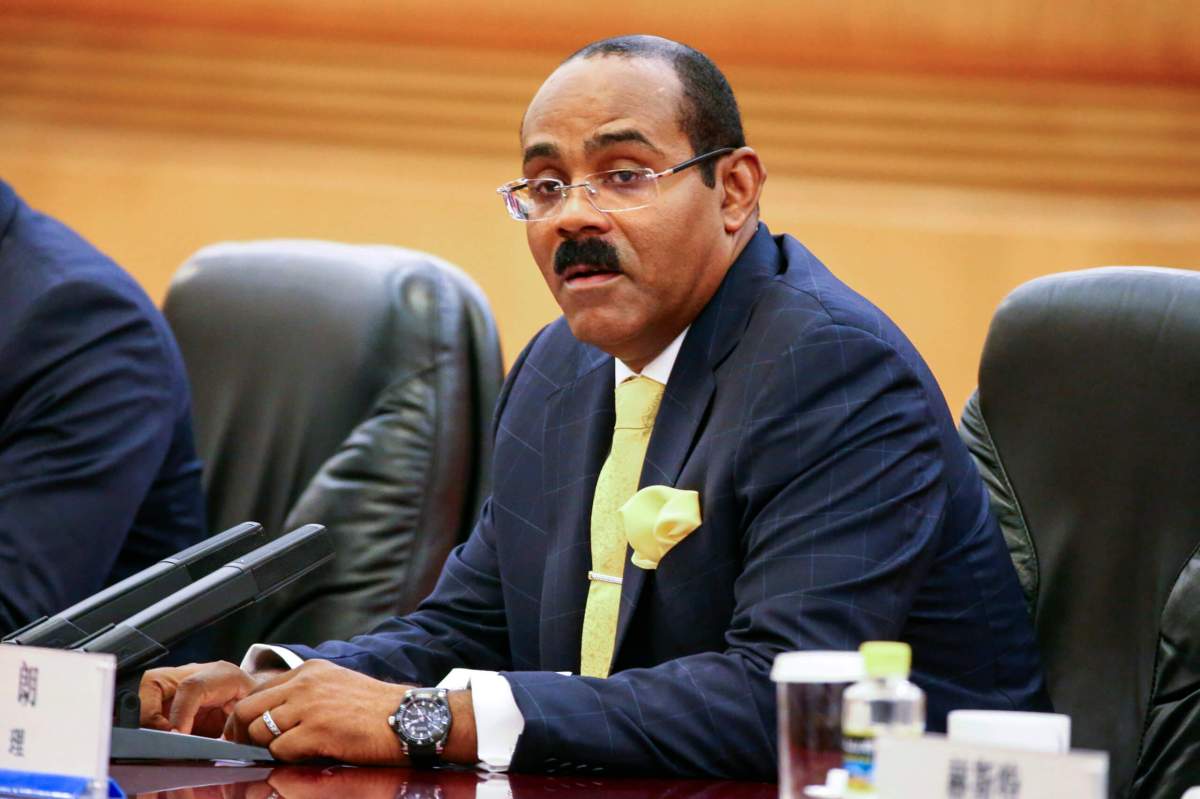Antigua
Antigua Prime Minister, Gaston Browne says that conditions are going to be put in place for the cash-strapped regional airline, LIAT to return to the skies next month.
But Minister of Information, Melford Nicholas told reporters that he would not want to give a specific date as to when the airline, in which the Barbados and St. Vincent and the Grenadines government have agreed to sell their shares, will resume operations.
Apart from Antigua and Barbuda, the other major shareholder government of the Antigua-based airline, is Dominica.
Nicholas said it augurs well for LIAT that the travel bubble will be in place and that people will be able to move with a degree of freedom within the region.
Earlier this year, Antigua and Barbuda unveiled a new plan for the airline, with the government proposing re-investment of EC$108 million and indicating that under the new plan it is prepared to underwrite up to 50 percent of the required capitalization.
The airline has suspended its commercial operations since March after many Caribbean islands shut down their airports as part of measures to curb the spread of the coronavirus.
Barbados
Six Caribbean countries have been deemed as safe for citizens of the United States to travel.
According to the Centers for Disease Control and Prevention (CDC), the countries that have no travel notice against them are Anguilla, Grenada, Montserrat, St. Kitts and Nevis, Dominica and St. Lucia as the likelihood of contracting Covid-19 in these countries is “very low.”
However, the CDC has listed as Level 3 the British Virgin Islands, Antigua and Barbuda, Barbados, Guadeloupe, Martinique, Puerto Rico, St. Martin, Trinidad and Tobago, Turks and Caicos Islands and the US Virgin Islands.
The CDC says Level 3 means that the likelihood of contracting the virus is “high, very high.”
For these countries, the CDC urges travelers to “avoid” and consider postponing non-essential travel.
Due to the pandemic, almost all countries have been placed on the CDC’s COVID-19 Travel Recommendations by Destination.
Caribbean
The 15-member Caribbean Community (CARICOM) grouping has condemned the latest European Union (EU) blacklisting saying it is arbitrary and non-transparent strategy employed by the EU.
In a statement CARICOM said: “The most recent inclusion of CARICOM states to the blacklist of alleged non-cooperative tax jurisdictions and jurisdictions identified as being deficient in the area of Anti-Money Laundering/Countering the Financing of Terrorism (AML/CFT), underscores the EU’s unwillingness to take into account the substantial progress made by CARICOM Member States at compliance with global standards.”
Barbados, The Bahamas and Trinidad and Tobago have been included in the latest EU list of 22 countries that have currently been identified as high-risk third countries for money laundering and terrorist financing. The list was released on Oct. 1, 2020.
The EU said in a statement that these countries are identified as having strategic deficiencies in their national anti-money laundering and counter-financing of terrorism regimes that pose significant threats to the EU’s financial system.
In its statement, CARICOM said that along with the unprecedented task of staging a post COVID-19 economic recovery, “these CARICOM countries now have the added burden of being subjected to the EU’s discriminatory tactics disguised as tax policy and governance.”
Grenada
The Grenada government said it will stage public consultations as part of efforts to determine the changes needed to the national laws and international treaties regarding the decriminalization of marijuana.
Minister of Agriculture, Peter David, who recently assumed his new post told reporters the Keith Mitchell government must consult with various stakeholders and he heads a three-member committee in accordance with the 2018 Regional Marijuana Commission report.
He said the government is looking at the models outside and in the region where the issue of cannabis has been dealt with.
David said persons must be aware the 2018 survey findings, which revealed 30 percent of Grenadians are for full legislation while 31 percent favored partial decriminalization.
Jamaica
Jamaica has recorded three more deaths as Oct. 18, bringing the total to 171 so far for this month from the coronavirus (COVID-19).
Health officials said that there were 95 new cases of the virus in the last 48 hours, pushing the total to 8,274.
The recent deaths range from 30 years old to 73 years. The Ministry of Health and Wellness said these new deaths are under investigation.
The new cases included 46 females with ages ranging from one year to 96 years.
The ministry said the total number of tests conducted since February is 27,773. There are now 15 people in isolation and recoveries increased to 186.
Barbados has so far recorded 222 cases with seven deaths. Guyana now has 3,734 positive cases after 74 new cases were recorded last week. There are 109 deaths, according to health authorities as of October 18.
In The Bahamas, the Ministry of Health confirmed 75 additional cases, bringing the total so far to 5,628 with 116 deaths recorded.
St. Lucia
Prime Minister of St. Lucia, Allen Chastanet has defended his government’s decision to impose fees for persons going into quarantine.
He said his administration has been paying an estimated EC$1million monthly in the past for state quarantine facilities.
Chastanet told reporters that while the imposition of quarantine fees was a difficult decision for Cabinet to make, it was a decision that was necessary.
The prime minister said the government has basically been covering the quarantine cost that includes the cost of rooms, security, nurses, feeding individuals, and renting the facilities.
Government established several quarantine centers since March when the island recorded its first case of the coronavirus that has so far infected 28 people on the island.
Chief Medical Officer, Dr. Sharon Belmar-George said effective Oct. 15, fees subsidized by the government will be applied for single occupancy is US$95; double occupancy US$165 and triple occupancy US$240.
Chastanet said the state quarantine service was supposed to end last July.
He said Cabinet agreed to extend it by one month. It then became August and “we realize we could not end it in August, so we extended it by an addition month, September.”
Trinidad
Trinidad and Tobago stands to benefit from an extension of a trade agreement between the Caribbean Basin and the United States, signed into law by US President Donald Trump recently.
The legislation extends preferential duty treatment for certain goods produced in the Caribbean Basin under the Caribbean Basin Economic Recovery Act until Sept. 30, 2030.
Trinidad and Tobago has been a beneficiary since inception in 1984 which has allowed for duty-free access of selected commodities into the US market.
The trade reference was due to expire on Sept. 30, 2020.
T&T exported US$551.8 million to the US in 2018, which represented an increase of 13.1 percent over its value in 2017.
The main exports to the US were methanol (US$449) and petroleum and petroleum-related products (US$55.4 million).
—Compiled by Azad Ali

























